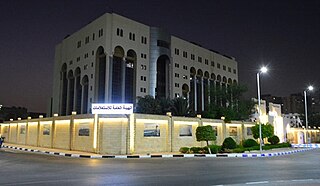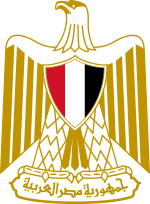
Egypt has a centralised system of local government officially called local administration as it is a branch of the Executive. The country is divided into twenty-seven governorates, the top tier of local administration. A governorate is administered by a governor, who is appointed by the President of Egypt and serves at the president's discretion.

The Cabinet of Egypt is the chief executive body of the Arab Republic of Egypt. It consists of the Prime Minister and the cabinet ministers.

The Ministry of Culture of Egypt is a ministry responsible for maintaining and promoting the culture of Egypt.
Hasaballah Mohamed El Kafrawy was an Egyptian engineer and politician who served as governor, Minister of Housing, and as a member of parliament.

The Ministry of Interior of Egypt is a part of the Cabinet of Egypt. It is responsible for law enforcement in Egypt.
Drinking water supply and sanitation in Egypt is characterized by both achievements and challenges. Among the achievements are an increase of piped water supply between 1998 and 2006 from 89% to 100% in urban areas and from 39% to 93% in rural areas despite rapid population growth; the elimination of open defecation in rural areas during the same period; and in general a relatively high level of investment in infrastructure. Access to an at least basic water source in Egypt is now practically universal with a rate of 98%. On the institutional side, the regulation and service provision have been separated to some extensions through the creation of a national Holding Company for Water and Wastewater in 2004, and of an economic regulator, the Egyptian Water Regulatory Agency (EWRA), in 2006. , many challenges remain. Only about one half of the population is connected to sanitary sewers. Partly because of low sanitation coverage about 50,000 children die each year because of diarrhea. Another challenge is low cost recovery due to water tariffs that are among the lowest in the world. This in turn requires government subsidies even for operating costs, a situation that has been aggravated by salary increases without tariff increases after the Arab Spring. Poor operation of facilities, such as water and wastewater treatment plants, as well as limited government accountability and transparency, are also issues.
The General Organization for Physical Planning (GOPP) is Egypt's national level regional planning body and is affiliated to the Ministry of Housing, Utilities and Urban Communities.

The Ministry of Electricity and Renewable Energy of Egypt is the government ministry in charge of managing and regulating the generation, transmission, and distribution of electricity in Egypt. Its headquarters are in Cairo. The current minister is Mohamed Shaker. The ministry was established in 1964 with presidential decree No. 147.

The Ministry of Information was the ministry in charge of media and information in Egypt between the 1971 until its latest dissolution in 2021.

The Ministry of Justice is the justice ministry of the government of Egypt. Its headquarters are in Cairo.

The Ministry of Water Resources and Irrigation is the ministry in charge of managing the water resources of the Arab Republic of Egypt mainly the Nile. It also manages irrigation projects in Egypt, such as the Aswan Dam and Al-Salam Canal. Its headquarters are in Cairo.
Tarek Wafik Mohamed is an Egyptian urban planner and former minister of housing during the Qandil Cabinet. He was the first housing minister of Egypt who is a specialist in urban development.
Abdel Qawi Khalifa is an Egyptian engineer, academic, former governor of the Cairo province and former minister of water and wastewater utilities, a ministerial office established in August 2012.

Sherif Ismail was an Egyptian engineer and politician who served as the prime minister of Egypt from 2015 to 2018. He was also the minister of petroleum and mineral resources from 2013 to 2015.
The New Administrative Capital (NAC) is a new urban community in Cairo Governorate, Egypt and a satellite of Cairo City. It is planned to be Egypt's new capital and has been under construction since 2015. It was announced by the then Egyptian housing minister Mostafa Madbouly at the Egypt Economic Development Conference on 13 March 2015. The capital city is considered one of the programs and projects for economic development, and is part of a larger initiative called Egypt Vision 2030.

The New Urban Communities Authority is an Egyptian state owned enterprise (SOE) affiliated to the Ministry of Housing. Its headquarters are in Sheikh Zayed City in Greater Cairo. It was established in accordance with law No. 59/1979. NUCA is tasked with addressing housing issues in Egypt by developing new urban communities to redistribute the population of existing cities away from Egypt's Nile valley and delta, and into the desert in order to save agricultural land from being urbanized.
Even though mathematically more housing than needed is produced in Egypt resulting in millions of vacant homes, large portions of its residents live in inadequate housing that may lack secure tenure, safe drinking water and wastewater treatment, are crowded or are prone to collapse, as better housing is widely unaffordable. While there is also a problem with homelessness especially amongst children.

Mostafa Kamal Madbouly is the Prime Minister of Egypt, serving since 2018. He was appointed by President Abdel Fattah el-Sisi to succeed Sherif Ismail following his government's resignation in the wake of Sisi's re-election. Madbouly also served in Sherif Ismail's cabinet as Minister of Housing, and had also briefly served as acting prime minister.

The Ministry of Finance & National Economy (MOFNE) is responsible for formulating and implementing the financial policies of the Kingdom of Bahrain within the overall vision of the Bahrain Government. The Ministry prepares the state general budget in coordination with other ministries and public entities in a way that reflects the financial and economic objectives of the Kingdom, particularly regarding improving living standards and increasing levels of economic growth.

The State Information Service is an Egyptian government agency affiliated to the Egyptian Presidency. It is the official media and public relations apparatus of the Egyptian state, with a number of local and international offices, and its responsible for regulating the affairs of foreign press and media correspondents in Egypt.








